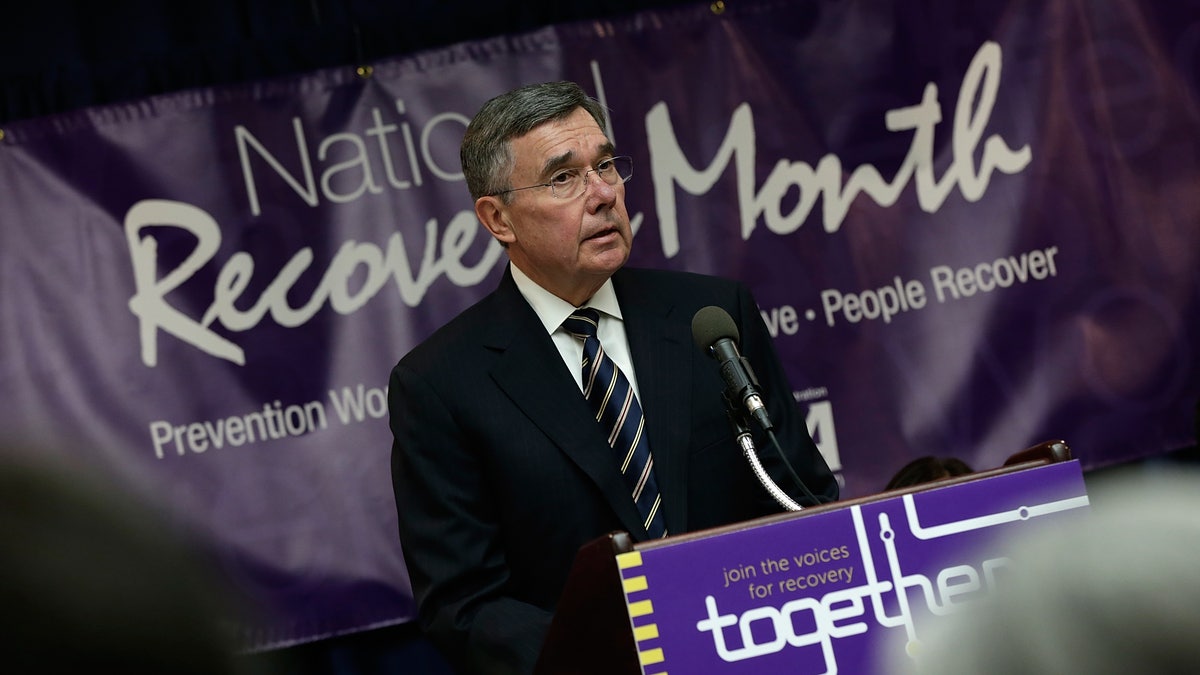
Gil Kerlikowske, Director of the Office of National Drug Control Policy, at a press conference September 4, 2013 in Washington, DC. (2013 Getty Images)
Even if you consider yourself up on current events and a major news hound, no one would fault you for not knowing the name Gil Kerlikowske. The president nominating a new commissioner for Customs and Border Protection would rarely garner headlines anyway, but since this president has been unable to get a Senate-confirmed commissioner in place his entire five years in office, it’s worth giving Kerlikowske a close look.
If I were on the Senate Finance Committee, here are some questions I’d pose to the president’s latest nominee.
What is it about your résumé that earned you the nomination to lead CBP? Are you an expert in trade or security?
Kerlikowske is currently the director of the White House Office of National Drug Control Policy. He’s spent his career in law enforcement leadership, having led police departments in Seattle and Buffalo. He also served in the Department of Justice and the police department in St. Petersburg, Fla.
He’s held impressive posts throughout his career. But what is it about any of those jobs that has prepared him to lead CBP, one of the most complex branches of the giant Department of Homeland Security, which is responsible for processing $2 trillion worth of trade each year and is so vital to our economy?
- Napolitano Pays Last Visit To Border Cities, Announces New Security Plans
- Use Of Excessive Force At The Border Needs Better Tracking: Report
- Homeland Security Illegally Seizes Laptops At Border, Group Claims
- Immigration Reform Renews Border Fence Debate
- Border Patrol Considers Razor Wire Fencing in Arizona
For those of us who are promoters of cross-border trade and travel, it’s fair to ask whether this cop will view the international trade sphere as just a new beat, and whether trade facilitation will take a back seat to enforcement. We simply can’t afford that.
Kerlikowske would put a lot of minds at ease in industry if he were able to walk into that hearing room and give a full-throated defense of trade and let business know that he intends to be a trade advocate.
What are your expectations of the private sector in helping CBP meet its responsibilities?
I believe that the federal government and industry can partner in ways to help CBP improve its staffing levels at our ports of entry and improve the infrastructure of the ports themselves. But I’ve become increasingly concerned over the last several months that the government is viewing the private sector as the sole source to fund these responsibilities, which could mean that certain ports get resources depending on their ability to pay rather than because of need. Congress and the trade community should know whether a pay-to-play model is being adopted by the Obama administration.
How will you manage the relationship between CBP and Border Patrol? Does CBP need more resources?
Yes, we all know that the CBP personnel in blue uniforms at the ports are supposed to be on the same team as the Border Patrol men and women in green uniforms between the ports. But 10 years after the formation of the Department of Homeland Security, the tension still exists between the two agencies.
It comes down to budget and what captures the public’s and Congress’ attention. In the immigration reform bill passed earlier this summer, the Senate says the Border Patrol should be over 40,000 agents strong. That’s huge. Meanwhile, CBP was mostly an afterthought in the Senate bill. The legislation seeks fewer than 4,000 new officers at the ports, but without a true barometer grounded in risk-based research those numbers were thrown around because they poll well.
Should companies that share data about their supply chain with CBP get preferential treatment when entering cargo into the U.S.?
The Customs-Trade Partnership Against Terrorism, or C-TPAT, is supposed to both speed up crossing times for participating companies and increase security. Companies share information with the government about their supply chains and in turn they get expedited service and undergo fewer secondary level inspections at the ports.
At least that’s how it’s supposed to work.
Many participants in the program will complain off the record that the service they’re receiving isn’t commensurate with the expense to get into and stay in the program.
The trade needs to hear from Kerlikowske whether he believes there’s room for improvement with the program.
Is international trade good for the United States?
This seems like softball question, but there are plenty of folks in Congress who are still, nearly 20 years after the implementation of NAFTA, extremely skeptical of trade’s effect on the U.S. economy and American jobs.
Kerlikowske would put a lot of minds at ease in industry if he were able to walk into that hearing room and give a full-throated defense of trade and let business know that he intends to be a trade advocate.
Let’s hope Kerlikowske at least gets a confirmation hearing. Under this president, that would be an accomplishment in itself.
